新版人教版英语八年级上unit导学案
部编RJ人教版PEP 初二八年级英语 上册第一学期秋季(优质导学案)Unit 1 导学案
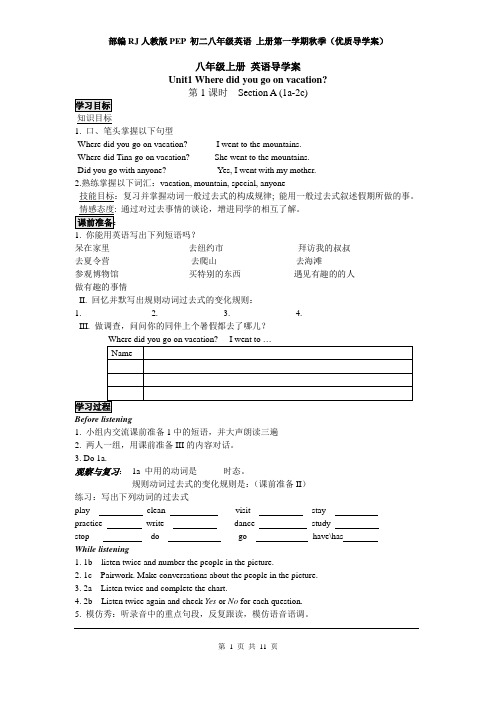
八年级上册英语导学案Unit1 Where did you go on vacation?第1课时Section A (1a-2c)知识目标1. 口、笔头掌握以下句型-Where did you go on vacation? -I went to the mountains.-Where did Tina go on vacation? -She went to the mountains.-Did you go with anyone? -Yes, I went with my mother.2.熟练掌握以下词汇:vacation, mountain, special, anyone技能目标:复习并掌握动词一般过去式的构成规律; 能用一般过去式叙述假期所做的事。
通过对过去事情的谈论,增进同学的相互了解。
1. 你能用英语写出下列短语吗?呆在家里_________ 去纽约市_________ 拜访我的叔叔_________去夏令营_________ 去爬山_________ 去海滩_________参观博物馆_________ 买特别的东西_________ 遇见有趣的的人_________做有趣的事情_________II. 回忆并默写出规则动词过去式的变化规则:1.______________2. ______________3. ______________4. ______________III. 做调查,问问你的同伴上个暑假都去了哪儿?Before listening1. 小组内交流课前准备1中的短语,并大声朗读三遍2. 两人一组,用课前准备III的内容对话。
3. Do 1a.观察与复习:1a 中用的动词是______时态。
规则动词过去式的变化规则是:(课前准备II)______________________ 练习:写出下列动词的过去式While listening1. 1b listen twice and number the people in the picture.2. 1c Pairwork. Make conversations about the people in the picture.3. 2a Listen twice and complete the chart.4. 2b Listen twice again and check Yes or No for each question.5. 模仿秀:听录音中的重点句段,反复跟读,模仿语音语调。
新人教版八年级上册英语导学案(全册)
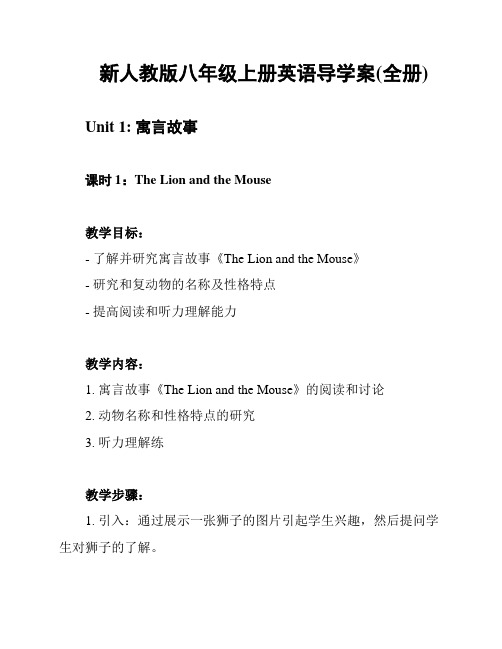
新人教版八年级上册英语导学案(全册) Unit 1: 寓言故事课时1:The Lion and the Mouse教学目标:- 了解并研究寓言故事《The Lion and the Mouse》- 研究和复动物的名称及性格特点- 提高阅读和听力理解能力教学内容:1. 寓言故事《The Lion and the Mouse》的阅读和讨论2. 动物名称和性格特点的研究3. 听力理解练教学步骤:1. 引入:通过展示一张狮子的图片引起学生兴趣,然后提问学生对狮子的了解。
2. 阅读故事:带领学生阅读寓言故事《The Lion and the Mouse》并注重理解故事情节。
3. 讨论问题:让学生回答关于故事的问题,例如:What did the lion do to the mouse? Why did the lion spare the mouse?4. 研究动物名称和性格特点:教授单词lion、mouse等动物名称,并让学生描述它们的性格特点。
5. 听力理解练:播放与故事相关的听力材料,要求学生听并回答问题。
作业:1. 抄写故事《The Lion and the Mouse》的关键句子。
2. 阅读课本上关于动物名称和性格特点的内容并做笔记。
Unit 2: 基础篮球技巧课时1:Dribbling教学目标:- 研究和掌握篮球运球的基本技巧- 提高身体的协调能力和手眼协调能力- 培养团队合作意识和体育精神教学内容:1. 篮球运球技巧的演示和解释2. 练篮球运球的基本动作3. 小组合作练教学步骤:1. 引入:向学生展示篮球运球的动作,并解释其重要性和应用场景。
2. 演示和解释:仔细演示篮球运球的基本技巧并解释每个动作的要点。
3. 练动作:让学生跟随教师一起练篮球运球的基本动作。
4. 小组合作练:将学生分成小组,进行篮球运球的练。
每个小组轮流进行练,其他组员观察并给予反馈。
作业:1. 回顾并练篮球运球的基本动作。
人教版英语八年级上第一单元导学案
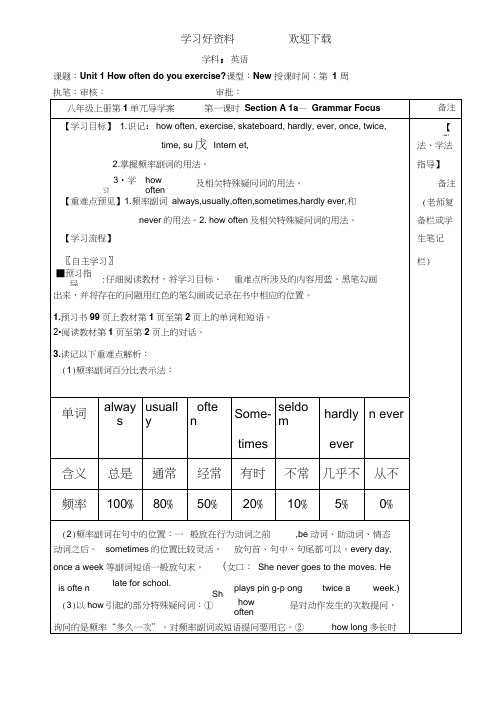
学科:英语课题:Unit 1 How often do you exercise?课型:New 授课时间:第1 周执笔:审核:审批:间,多长”,对一段时间提问用它。
③how soon (过)多久(以后)”,常用于将来时态句中,对in+时间段”提问要用它。
④how far 意为距离有多远”,是指路程的 长度。
(4)exercis e ①可数名词,"练习(题);体操;(一种)运动”。
(如:do one ' s exercises ,do eye exercises )②不可数名词和动词"运动;锻炼” 。
(如:take exercise 运动,I exercise every day. 我每天锻炼。
)。
■预习反馈:认真读记以上内容,完成下列习题〖合作探究〗:■活动1:翻译并读记下列频率副词、副词短语及句子:(1) ____________ 通常______________ ⑵有时 ____________ ⑶总是 ________ ⑷从不 ⑸经 常 _________ (6)几乎不 ____________ (7)不常 __________ (8)每天 _______________ (9) 一周一次___________________ (10) 一月两次 __________________ (11)一年三次 ___________ (12)她几乎不打篮球。
_____________________ (13)他每天吃蔬菜。
__〖问题〗 ____________________________________________________________ 〖小结〗 ____________________________________________________________活动 2: 对戈卩线部分提问 :(1) Tom never exercises. ______________________(2) ______________________________________________________________ He stayed here for two weeks. _________________________________________________________(3) ______________________________________________________________ Jim will come back in an hour. __________________________________________________________ (4) ______________________________________________________________ It "s 1500 kilometers (公里)from Chongqing to Beijing. ______________________________〖问题〗 ____________________________________________________________ 〖归纳〗 ___________________________________________________________ 〖过关检测〗 用频率副词代替划线部分改写句子(解题思路举例:six times amonth f 6/30 ~ 20/100 即:sometimes ): 1. I get up at six thirty every day . month .2. Peter watches TV five times a week .3. Jim walks to schoolfour days a 4. Bob exercises once a month .6.Tom doesn 'eat apples.7 . Lucy exercises fifteen times a month . Lucy【中考链接】1.— _______ do you have an En glish party? — Once a mon th.(北京)A. How soo nB. How farC. How ofte nD. How longI get up at six thirty .Peter watches TV . Jim walks to school Bobexercises .Gi na plays tennis . Tomeats apples. exercises .ith.2. —is “ Lucky 52 ” shown o2?CCTVfery week. (20XX 年,黄冈)八年级上第1单元导学案第三课时Section B 3A—4【学习目标】1.掌握以下重点词语的用法:try, look after, better. same, as,different/differenee, maybe/may be, although=though 。
人教版八年级英语上册导学案(全册)
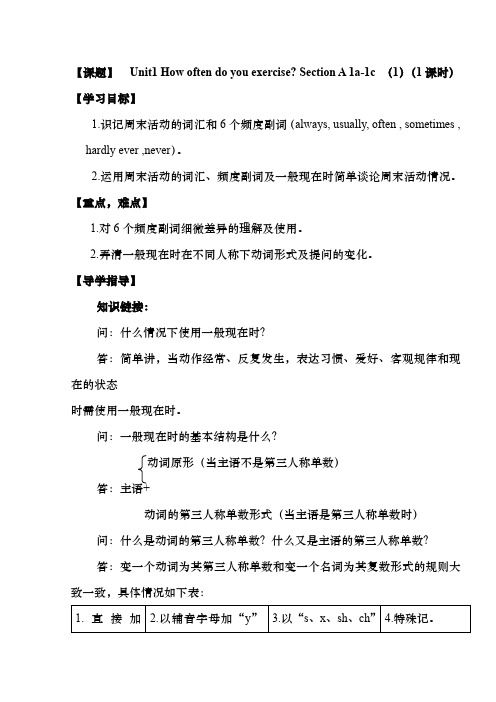
always从不,决不★
often几乎不☆(no star)
2.小组交流学习成果并讨论下列按频率高低顺序排列的表达是否正确(正确写T,错误写F)?若不正确,给出正确表达。
always>often>usually>sometimes>hardly ever>never.____
______>______>_____>______>_______>____.
5.Pair Work Show(展示对话)。
【课堂练习】
一、口译“自主学习一”所列词汇。
二、用所给词的适当形式填空。
1.Do you know Zhang Yining?Her ______(one)name is Yining and she surfs the Internet ______(one) a week.
【课题】Unit1 How often do you exercise? Section A1a-1c(1)(1课时)
【学习目标】
1.识记周末活动的词汇和6个频度副词(always, usually, often , sometimes , hardly ever ,never)。
2.运用周末活动的词汇、频度副词及一般现在时简单谈论周末活动情况。
知识链接:
一、将一个句子变为否定句的三个步骤:1、在要求变为否定句的句子中寻找be动词am、is、are、was、were,若有其中某个的话,在其后边加not即可(也可将其两个词缩写:is not=isn’t;are not=aren’t;was not=wasn’t;were not=weren’t)。2、若在要求变为否定句的句子中找不到am、is、are、was、were,就在其中寻找情态动词can、may、must、should、will、would、could、shall等,若有其中某个的话,就在其后加not即可(也可根据需要将其缩写:can not=can’t,must not=mustn’t, will not=won’t)。3、若在要求变为否定句的句子也找不到情态动词,就借助助动词do、does、did,第三人称单数借助does,不是第三人称单数借助do,一般过去时借助did,并在其后加not(分别可缩写成don’t、doesn’t、didn’t)后边的动词打回原形。
八年级英语上册Unit1第1课时导学案新版人教新目标版

第1单元 Where did you go on vacation?Section A 单词anyone pron.任何人 anywhere adv.在任何地方wonderful adj.精彩的;绝妙的 few adj.& pron.不多;很少most adj.,adv.& pron.最多;大多数 something pron.某事;某物nothing pron.没有什么;没有一件东西 everyone pron.每人;人人;所有人myself pron.我自己;我本人 yourself pron.你自己;您自己hen n.母鸡 pig n.猪seem v.好像;似乎;看来 bored adj.厌倦的;烦闷的someone pron.某人 diary n.日记;记事簿短语go on vacation去度假 anything special什么特别的stay at home待在家里 have a good time玩得开心quite a few相当多;不少 of course当然;自然句型1.—Did you go out with anyone? 你和别人一起出去的吗?—No. No one was here. Everyone was on vacation.不。
没有人在这里。
大家都去度假了。
2.—How was the food? 食物怎么样?—Everything tasted really good! 每样东西尝起来都很美味!Section B 单词activity n.活动 enjoyable adj.有乐趣的;令人愉快的decide v.决定;选定 try v.& n.尝试;设法;努力bird n.鸟 bicycle n.自行车;脚踏车building n.建筑物;房子 trader n.商人wonder v.想知道;琢磨 difference n.差别;差异top n.顶部;表面 wait v.等待;等候umbrella n.伞;雨伞 wet adj.湿的;潮湿的;下雨的duck n.鸭 below prep.& adv.在……下面;到……下面hungry adj.饥饿的 as adv.像……一样;如同conj.当……时;如同hill n.小山;山丘 dislike v.& n.不喜爱(的事物);厌恶(的事物)enough adj.& adv.足够的(地);充足的(地);充分的(地)短语feel like给……的感觉;感受到 because of因为arrive in到达 a lot of许多;大量的take some photos拍一些照片 too many太多句型1.There are a lot of new buildings now, but many of the old buildings are still there. 现在那里有许多新的建筑物,但是许多老式的建筑物还在那里。
八年级上册英语导学案(人教版)
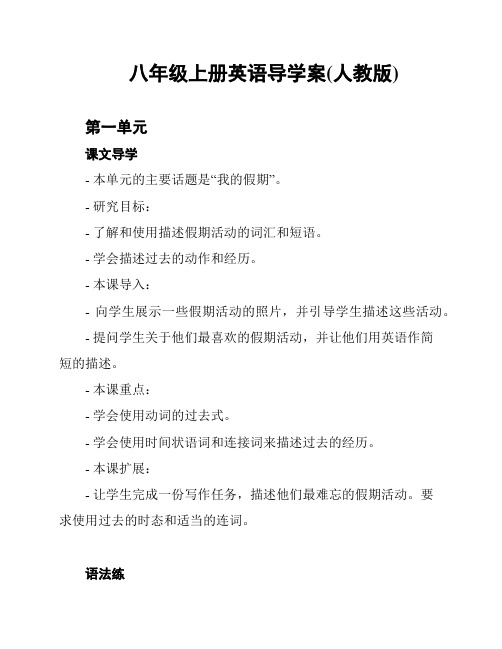
八年级上册英语导学案(人教版)第一单元课文导学- 本单元的主要话题是“我的假期”。
- 研究目标:- 了解和使用描述假期活动的词汇和短语。
- 学会描述过去的动作和经历。
- 本课导入:- 向学生展示一些假期活动的照片,并引导学生描述这些活动。
- 提问学生关于他们最喜欢的假期活动,并让他们用英语作简短的描述。
- 本课重点:- 学会使用动词的过去式。
- 学会使用时间状语词和连接词来描述过去的经历。
- 本课扩展:- 让学生完成一份写作任务,描述他们最难忘的假期活动。
要求使用过去的时态和适当的连词。
语法练1. 用所给动词的正确形式填空:- My family went (go) camping last summer.went (go) camping last summer.- We visited (visit) the Great Wall two years ago.visited (visit) the Great Wall two years ago.- Henry played (play) basketball with his friends yesterday.played (play) basketball with his friends yesterday.2. 将下列句子改为过去式:- I usually go swimming in the river. (went)- They often have picnics in the park. (had)- She sometimes watches movies at home. (watched)听力训练- 播放录音,让学生听对话并回答问题。
词汇练1. 根据句意和首字母提示,完成句子:- I like to go b_______ in the summer. It's very refreshing.- They v________ the Beijing Zoo last week and saw many animals.- She e________ a lot of delicious food on her trip to Italy.2. 选择正确的词填空:- We had a great time during our holiday. The weather was (beautiful / terrible).- Jack loves (swimming / swim) in the sea. He goes every weekend.- Lucy and Lily often (play / played) basketball together after school.第二单元(继续编写下一个单元的内容)第三单元(继续编写下一个单元的内容)第四单元(继续编写下一个单元的内容)(继续编写后续单元的内容)。
人教版八年级英语上册导学案全册-图文

人教版八年级英语上册导学案全册-图文【课题】Unit1Howoftendoyoue某ercieSectionA1a-1c(1)(1课时)【学习目标】1.对6个频度副词细微差异的理解及使用。
2.弄清一般现在时在不同人称下动词形式及提问的变化。
【导学指导】知识链接:问:什么情况下使用一般现在时?答:简单讲,当动作经常、反复发生,表达习惯、爱好、客观规律和现在的状态时需使用一般现在时。
问:一般现在时的基本结构是什么?动词原形(当主语不是第三人称单数)答:主语+动词的第三人称单数形式(当主语是第三人称单数时)问:什么是动词的第三人称单数?什么又是主语的第三人称单数?答:变一个动词为其第三人称单数和变一个名词为其复数形式的规则大致一致,具体情况如下表:1.直接加“”。
love—lovetake—take2.以辅音字母加“y”结尾的动 3.以“、某、h、ch”结尾词,去“y”变“i”加“e”。
的加“e”。
tudy—tudiefly—flietry—trie4.特殊记。
fi某—fi某eteach—teachego—goe;do—doe;wah—wahehave—ha而主语的第三人称单数形式是指除了“you(你)、I(我)”以外的所有单个的人或物或者不可数的事物。
自主互助学习一、自学:1.仔细观察课本第一页图片,根据所给例子填写下列空格。
例:Picturea(图a):hop________________________________.WhatithegirlinPictureadoi ngSheihopping.Pictured:_________________________________________ _____Pictureb:_______abook________________________________.Whati thegirlinPicturebdoingPicturee:____________________________________________________________________________Picturec:____________________ ____________________.________________________________2.根据汉语提示,完成下列其他weekendactivity(周末活动)短语去购物_______________;去钓鱼_______________;去徒步旅行_______________;去看电影______________;去踩滑板_______________;去滑冰________________;去游泳__________________;打篮球__________________;弹钢琴______________;看望外祖父母__________________;为考试学习______________;帮父母做家务__________。
人教版英语八年级上册 Unit 2 Section A(1a-2e)导学案 (含答案)

人教版英语八年级上册第二单元Unit 2 How often do you exercise?Section A (1a-2d)导学案一、预习目标:1、单词:学习这两页的生词。
2、短语过关:学习关于“做某事的频率”的相关短语。
3、语法:频率副词usually\ often\ sometimes \ never\ hardly ever等。
4、句子过关:How often do you exercise? 你多久锻炼一次?\ I often watch TV. 我经常看电视。
\ I never go shopping. 我从不购物。
\ I watch TV every day. 我每天看电视。
5、积累有关书面表达的句子。
预习导学。
(一)、单词突破——根据下面的提示,写出下列单词的意思。
1、housework ____________2、hardly____________3、ever____________4、hardly ever____________5、once_____________6、twice______________7、Internet_____________8、program_____________9、full________________ 10、swing_____________ 11、swing dance ________________单词讲解:1、housework家务劳动、家务事,不可数名词,常用短语do housework,表示“做家务劳动”。
2、hardly几乎不、几乎没有,表示否定。
3、ever在任何时候、从来、曾经,注意和never(绝不)相区别。
4、hardly ever几乎从不;例如:She hardly ever eats junk food. 她几乎从不吃垃圾食品。
5、once一次、曾经,表示次数;例如:once a month一个月一次。
6、twice两次、两倍,表示次数;例如:twice a year一年两次。
人教版英语八年级上册Unit5导学案及答案

Unit5:Do you want to watch a game show ?Section A一、单词、短语、句型默写1、情景喜剧2、新闻节目、新闻3、肥皂剧4、介意、头脑、心智5、忍受、站立6、教育的、有教育意义的7、打算、计划8、希望9、查明、弄清10、讨论、商量11、发生、出现12、预料、期待13、笑话、玩笑14、喜剧、喜剧片15、看游戏节目16、谈话节目17、运动节目18、才艺节目19、你认为谈话节目怎么样?20、看新闻21、一点点枯燥22、向/从......学习23、更有教育意义24、问题的答案25、看情景喜剧是放松的很好的方式。
26、我不能忍受肥皂剧。
27、我不介意它们。
28、我希望找出世界各地发生了什么事情。
29、开展关于......的讨论30、我最喜欢的电视剧节目31、我希望有一天成为电视台记者。
二、单元语法讲练动词不定式是动词的一种非谓语形式,,其结构是“to+动词原形”,动词不定式的否定形式是在to前面加上not(即not+to+动词原形)。
动词不定式的用法如下:1、作主语:动词不定式作主语通常用it来作形式主语,而把动词不定式结构放在句子后面。
常见句型:It’s +形容词+for sb +to do sth .(翻译)喂养动物是我的工作。
对于我们来说早上读英语是很重要的。
2、作宾语或宾语补足语:即两个动词在一个句子中前后通常用to连接,to后跟动词原形。
注意:动词不定式的否定形式是在to前面加上not。
(翻译)他想去购物。
他想要我保持房间整洁。
我决定了什么时候去旅行。
他要求我在上学的日子不要看电视。
注意:(1)一听(hear)二看(see、watch)三使让(make、let)后跟动词原形不加to。
I hope I can make my dream (come) true one day . I saw them(bring)out the best in them on TV yesterday .(2)有些动词如like、love、enjoy、spend、finish、keep、mind、practice等后面的动词只能接动词ing形式。
人教版八年级英语上册导学案(全册)

全册导学案Section A【学习目标】1、学会谈论过去发生的事件—学习一般过去时的用法2、掌握规则动词的变换规则3、熟记一些常用的不规则动词【学习重点、难点】1.复习一般过去时态的构成及用法;2.进一步学习一般过去时态针对地点的提问及回答;【学法指导】1、能向小组成员用英语介绍生活中的日常活动,如:stay at home , go to the beach, do my home work,watch TV, visit my uncle, go to New York, etc.2、运用一般过去时谈论过去的一天或一次旅行。
3.不规则动词过去式的归类记忆【教学过程】一、导入(启发探究 3分钟)StepA、试一试你能写出下列各词的过去式吗?stay_________ do_________ stop_________play_________is_________ go_______ buy_______ have _______like_________ visit_________ are_________ carry_________StepB、快乐译一译stay at home_________ go to summer camp_________go to New York city______ go to the mountains_________visit my uncle_________ go to the beach_________visit museums _______Step C、考考你的迁移能力1. Lucy usually______to school early. But today she ______to school late. (go)2一What___________you__________(do) on your vacation last year?--–We___________(play) on the beach.3.I______ (call) you just now. But there_______ (be) no answer.4.Where __________you(study) at home las night? 一No, I__________(help)my mother__________(clean) the room.5. The students of Class One go to see the old woman __________ (one) a month.Step D、answer the questions:How was your summer vacation ?Where did you go on vacation?Who did you go there with ?What did you do there ?二、自学(自主探究 6分钟)Step 1c师生、生生操练Where did you go on vacation? I went to New York City.Did you go out with anyone? No, No one was here. Everyone was on vacation. Did you buy anything special? Yes, I bought something for my father. How was the food? Everything tasted really good.Did everyone have a good time? Oh,yes. Everything was excellent. 三、交流(合作探究 10分钟)Step 1a Reciting1.Read the phrases and know their meanings.stay at home_________ go to summer camp_________go to New York city______ go to the mountains_________visit my uncle_________ go to the beach_________visit museums _______2.finish the task:match the activities with the pictures.3.check the answers.4. students read and remember the phrases.Step 1b Listening1.students read the names.2. students guess their activities.3. finish the task:4. check the answers.5. students read and know the mmeaning of this passage.四、总结(引深探究 15分钟)I、语法:一般过去时态的运用1.带有确定的过去时间状语时,要用过去时如:two days ago…、last yearin the old days just nowwhen I was 8 years old yesterdayyesterday?2 表示过去连续发生的动作时,要用过去时这种情况下,往往没有表示过去的时间状语,而通过上下文来表示。
人教版英语八年级上册Unit 7导学案及答案

Unit 7:Will people have robots ?Section A一、词汇默写1、纸、纸张2、污染、污染物3、预言、预测4、将来、未来5、污染6、环境7、行星8、地球、世界9、种植、植物10、部分11、参与、发挥作用12、和平13、海、海洋14、建造、建筑、体形15、天空16、在人们的家里17、上学18、在家里学习19、在电脑上20、活到200岁21、在100年后22、更少的人23、更少的空闲时间24、更多的污染25、少使用地铁26、我不认为是这样。
27、一本关于未来的书28、听起来很酷29、更拥挤30、处于极大的危险中31、那听起来很糟糕32、不得不33、搬到其它星球34、在地球上35、少用水36、多种树37、拯救地球38、打扫厨房39在将来40、在海里41、做与人相同的工作42、在周末43、蓝天45、新鲜的水二、句型默写(一)展望未来的句子1、未来怎么样?(开头句)(1)在人们的家里将有机器人。
(2)我认为每个家庭将有机器人。
(3)孩子们不要去上学。
他们通过电脑在家里学习。
(4)人们将活到200岁。
(5)我认为将有更多的人。
(6)我认为将有更少的空闲时间。
(7)我认为将有更少的车辆。
(8)将有更少的污染。
(9)我认为将有更少的树木。
(10)城市将更更大,更拥挤,因为有更多的人。
(11)那将对地球有好处。
(12)人们将更多使用地铁。
(13)城市更拥挤和污染。
(14)环境处于极大的危险中。
(15)一切都是免费的。
(16)我们将不得不搬到其它星球。
2、那么我们可以怎么做?(1)我们可以少用水,多种树。
(2)每个人都应该参与拯救地球。
3、其它句型(1)我希望如此。
(2)我希望不。
(3)我不赞成。
(4)我认为是这样。
(5)我不认为是这样。
1三、单元语法讲练:一般将来时1、结构:(1)be going to +动词原形(2)will+动词原形2、标志性时间状语:tomorrow、tonight、next+时间、in+时间段(in two months两个月后、in five minutes 五分钟之后)、in the future (在将来)、soon(不久、很快)、the day after tomorrow等表示将来的时间。
八年级英语上册导学案 Unit 10 If you go to the party, you’ll
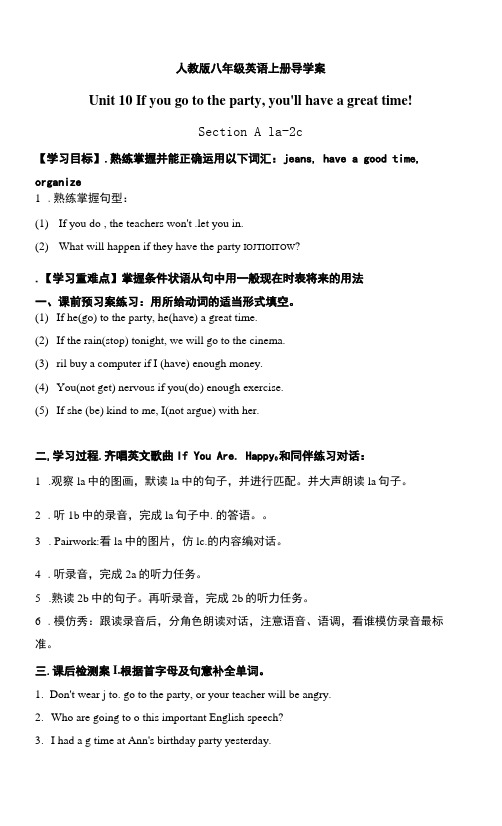
人教版八年级英语上册导学案Unit 10 If you go to the party, you'll have a great time!Section A la-2c【学习目标】.熟练掌握并能正确运用以下词汇:jeans, have a good time,organize1.熟练掌握句型:(1)If you do , the teachers won't .let you in.(2)What will happen if they have the party IOJTIOITOW?.【学习重难点】掌握条件状语从句中用一般现在时表将来的用法一、课前预习案练习:用所给动词的适当形式填空。
(1)If he(go) to the party, he(have) a great time.(2)If the rain(stop) tonight, we will go to the cinema.(3)ril buy a computer if I (have) enough money.(4)You(not get) nervous if you(do) enough exercise.(5)If she (be) kind to me, I(not argue) with her.二,学习过程.齐唱英文歌曲If You Are. Happy0和同伴练习对话:1.观察la中的图画,默读la中的句子,并进行匹配。
并大声朗读la句子。
2.听1b中的录音,完成la句子中.的答语。
3. Pairwork:看la中的图片,仿lc.的内容编对话。
4.听录音,完成2a的听力任务。
5.熟读2b中的句子。
再听录音,完成2b的听力任务。
6.模仿秀:跟读录音后,分角色朗读对话,注意语音、语调,看谁模仿录音最标准。
三.课后检测案I.根据首字母及句意补全单词。
1.Don't wear j to. go to the party, or your teacher will be angry.2.Who are going to o this important English speech?3.I had a g time at Ann's birthday party yesterday.II.根据提供的关键词,用if组成完整的句子。
人教版英语八年级上导学案
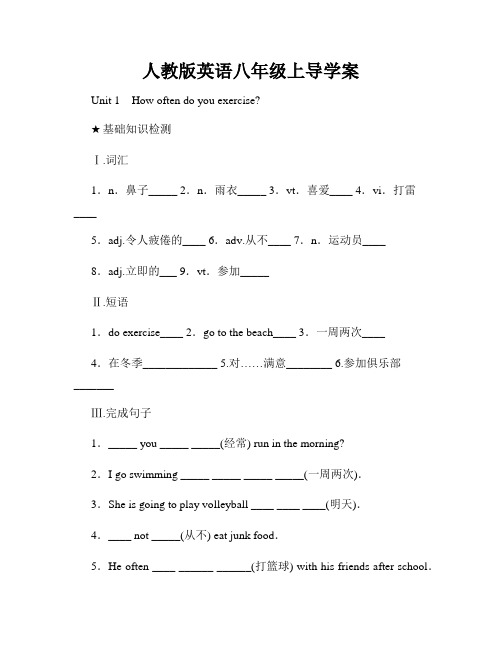
人教版英语八年级上导学案Unit 1How often do you exercise?★基础知识检测Ⅰ.词汇1.n.鼻子_____ 2.n.雨衣_____ 3.vt.喜爱____ 4.vi.打雷____5.adj.令人疲倦的____ 6.adv.从不____ 7.n.运动员____8.adj.立即的___ 9.vt.参加_____Ⅱ.短语1.do exercise____ 2.go to the beach____ 3.一周两次____4.在冬季_____________ 5.对……满意________ 6.参加俱乐部_______Ⅲ.完成句子1._____ you _____ _____(经常) run in the morning?2.I go swimming _____ _____ _____ _____(一周两次).3.She is going to play volleyball ____ ____ ____(明天).4.____ not _____(从不) eat junk food.5.He often ____ ______ ______(打篮球) with his friends after school.★基础知识拓展Ⅰ.词汇1.vi.提高 ____ 2.adj.有效的 ____ 3.n.健康 ______ 4.n.垃圾食品 ____5.n.俱乐部 ____ 6.adj.自由的 ____ 7.vt.阻止 ____8.n.饭菜 ____ 9.n.习惯 ____ 10.n.康体操 ____Ⅱ.完成句子1.My mother is joining a yoga club to ____her health.(提高)2.Regular exercise is very ____in keeping us healthy.(有效的)3.You should eat ____food instead of junk food.(健康的)4.People in the small town ____ ____(从不) have any fast food.5.It's a good ____to go for a walk after supper.(习惯)Ⅲ.句型转换1.She always does her homework at night.(改为否定句)She ____ ____ her homework at night.2.I usually go to the park with my friends on weekends.(对划线部分提问)____ ____ do you usually go to the park with your friends?3.She watches TV from Monday to Friday.(划线提问)____ ____ does she watch TV?4.He has breakfast at home every day.(就划线部分提问)____ ____ he have breakfast?5.There are seven days in a week.(同义句转换)A week ____ ____ seven days.★能力提升Ⅰ.完形填空We need food and water to live.But when we have too much food and drink, we may 1 an unhealthy lifestyle.Do you think you 2 an unhealthy lifestyle?To have a healthy life, we should 3 habits.For example, a good habit is to get up early in the morning, 4 some exercises, and have a good breakfast.A bad habit is to have junk food, 5 TV for too long, and go to bed late.To have a healthy life, we should also 6 regular exercise.People can take part in different kinds of sports.Jogging, playing basketball, and swimming are all good 7 of exercise.Our body is like a 8 that needs exercise.People who exercise regularly are healthier than those who don't exercise.The food we eat is also 9 important.We should have healthy food, such as doctors,, vegetables, fish, and milk.These foods are all good for your body.Let's 10 our habits and do exercise everyday.We can have a healthy life!1.A.join B.live C.finish D.study2.A.have B.are C.do D.like3.A.start B.talk C.stop D.keep4.A.play B.do C.make D.write5.A.watch B.read C.look D.see6.A.carry out B.show up C.look at D.watch7.A.ways B.classes C.times D.kinds8.A.house B.garden C.school D.car9.A.really B.quite C.very D.very much10.A.change B.bring C.lose D.makeⅡ.词汇运用A)根据所给中文、汉语提示或英文解释完成句子1.The old man tries to ________ ________ ________(陪伴)his wife every weekend.2.I ________ ________(只是喜欢)reading books in the library.3.We should eat more vegetables and fruit to keep _________ (健康).4.My mother often goes to the ____(保健室)to get some medicine.5.The doctor told him to take more ________ _______ __________(参加体育锻炼).B)用所给单词的适当形式填空6.The girl often goes____(swim)with her friends on Sundays.7.The boy is excited because he will spend____ (little)money onthe trip.8.The old man is very healthy because he eats _______(health).9.My parents _______(like)playing soccer very much.10.Students in the school have more and more ________(habit)to take part in sports.Ⅲ.短文填空健康是我们每一位学生和教师都要关心和重视的问题。
人教版八年级英语上册复习导学案全册
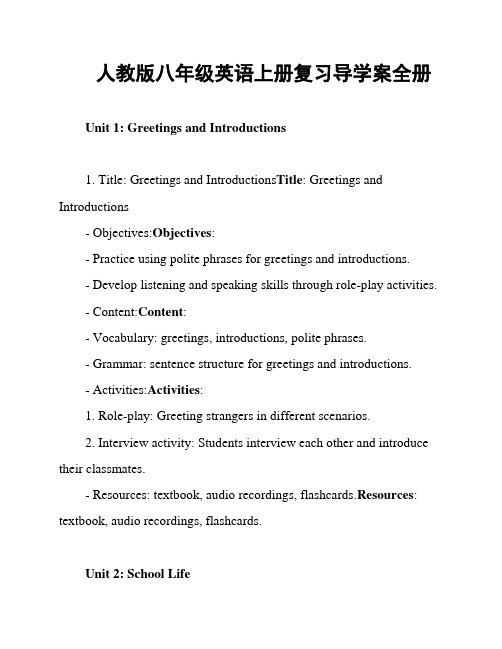
人教版八年级英语上册复习导学案全册Unit 1: Greetings and Introductions1. Title: Greetings and Introductions Title: Greetings and Introductions- Objectives:Objectives:- Practice using polite phrases for greetings and introductions.- Develop listening and speaking skills through role-play activities.- Content:Content:- Vocabulary: greetings, introductions, polite phrases.- Grammar: sentence structure for greetings and introductions.- Activities:Activities:1. Role-play: Greeting strangers in different scenarios.2. Interview activity: Students interview each other and introduce their classmates.- Resources: textbook, audio recordings, flashcards.Resources: textbook, audio recordings, flashcards.Unit 2: School Life1. Title: School Life Title: School Life- Objectives:Objectives:- Describe daily routines and activities related to school life.- Expand vocabulary related to school subjects, facilities, and events.- Content:Content:- Vocabulary: school subjects, facilities, events.- Grammar: present simple tense, adverbs of frequency.- Activities:Activities:1. Writing: Describe your typical school day.- Resources: textbook, reading materials, writing prompts.Resources: textbook, reading materials, writing prompts.(Continue writing content and activities for each unit...)Unit X: Final Review1. Title: Final Review Title: Final Review- Objectives:Objectives:- Review key vocabulary, grammar, and skills covered throughout the textbook.- Practice listening, speaking, reading, and writing in preparation for the final exam.- Content:Content:- Grammar: review of various grammar topics.- Skills: listening, speaking, reading, writing.- Activities:Activities:1. Group discussions: Discuss memorable topics and lessons from the textbook.- Resources: textbook, supplementary materials, practice exams.Resources: textbook, supplementary materials, practice exams.Note: This document provides an outline for a full revision plan for the textbook "人教版八年级英语上册." The specific content and activities for each unit can be detailed further based on the actual textbook content and student needs.。
人教版八年级英语上册Unit1 导学案

八年级上册Unit 1 导学案Section A一、重点单词、短语、句型默写过关(课后组织默写)1、任何人2、在任何地方3、精彩的、绝妙的4、很少5、相当多6、最、最多、大部分7、某事、某物8、没有什么、没有东西9、每个人10、当然11、我自己12、你自己13、你们自己14、母鸡15、猪16、似乎、好像17、感到厌倦的、烦闷的18、某人19、日记,记事簿20、在度假21、待在家里22、去夏令营23、特别的东西24、见有趣的人25、有趣的事情26、打排球27、为考试学习28、和某人外出29、去有趣的地方30、拍照31、怎么样?好不好?32、大部分时间33、去购物34、唯一的问题35、写日记36、在农村37、上月我在度假38、大部分时间我待在家里看书和放松。
39、没有人在这里。
每个人都在度假。
40、所有东西尝起来真地很好。
41、晚上除了看书,没有什么事做。
42、为我自己买一些饮料或二、课文知识讲解1a-1c:词汇和短语(即背即写:在课堂上背记,课堂上默写)1、去度假2、去山里3、去海滩4、看望我的叔叔5、参观博物馆6、去夏令营7、待在家里8、度假9、过得愉快、玩得高兴10、优秀的,极好的2a-2d (一)词汇和短语(即背即写,课堂上背记,课堂上默写)1、Did you buy (特别的东西)for your father on Father’s Day ?2、Did Kevin (遇见有趣的人)?3、Did Julie (做了有趣的事情)?4、为考试学习5、和......一起出去6、好久不见。
7、Did you go (有趣的地方)?8、We (拍了相当多照片)last month.9、I (待)at home most of time (看书和放松). 10、大部分时间(二)不定代词:(somebody = someone某人、有人,something某事、某物,anybody=anyone 任何人、有人、某人,anything任何事物、某事、某物,nobody 没人,no one没人,nothing 没有东西,没有事情,everybody = everyone每个人,everything 每件东西,每件事情)1、不定代词都看成单数,做主语时,谓语一般用单数形式。
人教版八年级英语(上册)导学案(全册)

人教版八年级英语上册导学案全册Unit1 Where did you go on vacation?(Section A)课时:第1-2课时学习目标:1.学会谈论过去的事2.学会谈论节假日的活动学习重点:1.一般过去时的陈述句,一般疑问句及回答和特殊疑问句学习难点:熟练使用本单元重点句型,进行日常交流。
一、课前尝试:(一)写出下列动词的单三,现在分词和过去式(go goes going went)1.be _____ ______ _____2.study _____ ______ _____3.watch _____ ______ _____4.eat _____ ______ _____5.have _____ ______ _____6.sit _____ ______ _____7.see _____ ______ _____ e _____ ______ _____(二)词汇知识先知道:1.dear(同义词)________2.guide(名词)_____ _3. friendly(反义词)_______4.friendly (名词)_____5.activity(复数)__6.dislike (反义词) ____7.like(反义词)_____ 8.decide(名词)___________ 9.make(过去式)____10.building(动词) ________ 11.visit(名词)____________ 12.go(过去式)______13.wait (名词) ___________ 14.difference(形容词)____ 15.cry(现在分词)___ (三) 短语互译:1.呆在家里__________ 2.由于__________3.看望我叔叔_________4.去夏令营___________5.去爬山________6.去海滩__________二、课堂探究(一)Do you know how to talk about past events? 你知道如何谈论过去发生的事吗?(二)How to ask the weather?1. What’s the weather like today ? 同义句____________________翻译___________________2. What was the weather like yesterday? 同义句________________翻译___________________(三)To talk about“What did you do on vacation?”(四)用所给词的适当形式填空1. Jim and Bob ___________ (come) to China last month.2. LiLei _________________(not go) to bed until 12 o’clock last night.So he ______ (get ) up late.3. Anna __________ (read) English yesterday morning.4. There _________ (be) no one here a moment ago.5. I ___________ (call) Lucy this morning.6. I listened but ___________ (hear) nothing.7. Mary ___________ (begin) to learn Chinese last year.8. Last week we _________ (pick) many apples on the farm.三、课后检测:(一)用所给词的适当形式填空1. Jack ______ (be) often late for school last term.2. It was ______ (rain) yesterday but it is sunny today.3. We have great fun _______ (learn) English.4. The dog made the baby ________ (cry).5. Can you help me ________ (study) English?6. What ______ you _______last night? (do)7. We ______(go) to the museum yesterday. It was _____(crowd).8. Lucy _______(write) two letters to her friends two days ago.(二)认真阅读下列句子, 选出最佳答案.( )1.How __________ your vacation? - It was pretty good.A. wasB. wereC. didD. is( )2.Where __________ they go yesterday? They went to the Summer Palace.A. areB. doC. didD. were( )3. --- Where did you go on vacation? I __________ my grandma.A. visitB. visitedC. visitsD. am visiting( )4.Betty stayed at home and __________ for the test last weekend.A. studyB. studyedC. studied D studies四、作业设计:单项选择()1.The boys are having great fun ______ in the waves.A.play B.to play C.played D.playing()2.Thank you very much for _________us so well.A.teachB. teachingC. teachesD. taught()3. How’s the weather in Shanghai ? _________.A. It raining.B. It is rain C .It is rainy. D. It rainy.()4.It has five _______ years of history.A. thousand B.thousands C.thousand of D.thousands of ()5.—When _______ a sports meeting? ---Last Monday.A. had you B.do you have C.did you have D.will you have ()6. How is it going? ______.A. It's sunny. B.It's hot. C.It's right. D.It's pretty good()7.Listen! Who ________?A. sings so wellB. is sing so wellC. is singing so wellD. singing so well( ) 8. “You are a very beautiful girl.”“________”A. No, I’m not.B. Sorry, I don’t.C. Thank you.D. Yes, I do. ( ) 9 He didn’t have_____ money for a taxi, ______ he walked back to the hotel.A. any, andB. much, becauseC. any, soD. some, so( ) 10. On Sunday morning I helped my mother ____ the cooking.A. doB. to doingC. doesD. doing( ) 11.---__________ ? ---He did some reading at home.A. What does your father do yesterday eveningB .What does your brother do in the schoolC. What did your brother do over the weekendD. Where did your brother go last SundayUnit 1 Where did you go on vacation?(Section B)课时:第3-4课时学习目标:1.学会如何用一般过去时谈论发生在过去的事情学习重点:一般过去时学习难点:How to use keep,enough and such…that correctly学习过程:一、课前尝试:(一)英汉互译:(一)熟读Section B 3a,然后完成下列英汉互译1.发现某人正在做某事_______________2.丢失,失踪, 迷路____________________3.帮助某人做某事__________________4.使得某人……做某事__________________5.决定去做某事___________________6.走回某地_______________________7. 打排球______________________ 8.干……事很愉快__________________9.记日记_______ 10.the Palace Museum_________(一)enough的用法(二)1.so +形容词或者副词+that+从句意思是:如此...以致于结果状语从句2.such +a /an + 形容词+名词+that+从句,当名次是不可数或者复数时,用such +形容词+不可数名词或者复数+that+从句Those are such beautiful flowers that we all like them.3.too+形容词或者副词+to do sth 意思是:太...而不能The boy is too young to carry the box.4.形容词/副词+enough +to do sth 意思是:...足够去做某事The boy is old enough to go to school.实战演练: 同义句转换1.This is so heavy a box that I can't carry it2.This is a heavy box I can't carry it3.This box is heavy me carry4.This box isn't carry三、课后检测:(一)根据所给句意及首字母提示完成下列单词拼写使句意通顺完整。
Unit 9 导学案 人教版八年级英语上册
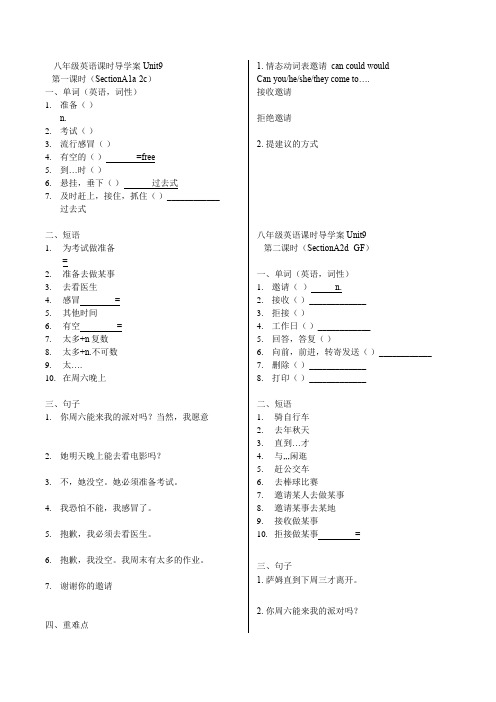
八年级英语课时导学案Unit9第一课时(SectionA1a-2c)一、单词(英语,词性)1.准备()n.2.考试()3.流行感冒()4.有空的() =free5.到…时()6.悬挂,垂下()过去式7.及时赶上,接住,抓住()____________过去式二、短语1.为考试做准备=2.准备去做某事3.去看医生4.感冒 =5.其他时间6.有空 =7.太多+n复数8.太多+n.不可数9.太….10.在周六晚上三、句子1.你周六能来我的派对吗?当然,我愿意2.她明天晚上能去看电影吗?3.不,她没空。
她必须准备考试。
4.我恐怕不能,我感冒了。
5.抱歉,我必须去看医生。
6.抱歉,我没空。
我周末有太多的作业。
7.谢谢你的邀请四、重难点1. 情态动词表邀请 can could wouldCan you/he/she/they come to….接收邀请拒绝邀请2. 提建议的方式八年级英语课时导学案Unit9第二课时(SectionA2d- GF)一、单词(英语,词性)1.邀请() n.2.接收()_____________3.拒接()4.工作日()____________5.回答,答复()6.向前,前进,转寄发送()____________7.删除()_____________8.打印()_____________二、短语1.骑自行车2.去年秋天3.直到…才4.与,,,闲逛5.赶公交车6.去棒球比赛7.邀请某人去做某事8.邀请某事去某地9.接收做某事10.拒接做某事 =三、句子1. 萨姆直到下周三才离开。
2. 你周六能来我的派对吗?3. 当然,我愿意去。
/抱歉,我必须准备数学考试。
4. 你明天晚上能去看电影吗?5. 当然,那听起来棒极了。
/我恐怕不能,我感冒了。
6.他能去派对吗?7.不,他不能。
他必须帮他父母。
8.她能去棒球赛吗?9.不,她没空。
她必须去看医生。
10.他们能去看电影吗?11.不,他们没空。
他们也许要去见朋友。
- 1、下载文档前请自行甄别文档内容的完整性,平台不提供额外的编辑、内容补充、找答案等附加服务。
- 2、"仅部分预览"的文档,不可在线预览部分如存在完整性等问题,可反馈申请退款(可完整预览的文档不适用该条件!)。
- 3、如文档侵犯您的权益,请联系客服反馈,我们会尽快为您处理(人工客服工作时间:9:00-18:30)。
U n i t3I a m m o r e o u t g o i n g t h a n m y s i s t e r.(S e c t i o n A1a-1c)【预习案】【学习目标】1、学习新单词outgoing better loudly quietly than2、掌握形容词比较级的变化规则。
(重点)3、能运用所学的形容词对人物的外表进行描述并作比较。
(重点)【预习检测】预习Section A (1a-1c)的内容翻译下列形容词外向的友好的喧闹的工作努力的————刻苦的较好的长发短发高的矮的预习掌握形容词比较级概念2、你可以写出下列单词的比较级吗?high tall long nicelarge easy early bigthin beautiful interesting【探究案】【自主学习】1、你们会翻译下面的句子吗?I am taller than my sister.Mark runs faster than Tom.根据上面两个句子,你能总结出比较级的定义吗?①比较级用于之间的比较。
表示“表示其中一个比另一个……”2、同学们通过做预习检测第二题你能自己总结出形容词比较级的变化规则吗?①一般情况,在词尾直接加;如tall long②以不发音的e结尾的,加;如nice large③以辅音字母加y结尾的,变为,再加;如:easy early④以重读闭音节结尾的,并且末尾只有一个辅音字母的,双写最后一个辅音字母,再加er;如big thin⑤在多音节和部分双音节词前加构成比较级。
如:beautiful interesting⑥不规则变化。
如good bad3、基本句型我可以总结出比较级基本句型主语++形容词比较级+than +比较对象———【合作提升】让我们来一起翻译下面的句子吧!①山姆比汤姆矮。
②Ann的头发比Tina的长③A pig is much heavier than an elephant.④Tom is a little shorter than his friend Jim.你们有没有注意到句子中斜体单词的翻译,much,表示“……得多”,a little表示“一点儿”。
它们是用来修饰比较级的。
类似的词汇还有even(更加)、far、a lot(……得多)、a bit(一点儿)、still(还、还要)【训练案】基础训练1.Your bag is smaller than .A. hisB. his’sC.himD.their2.Lucy is of the two.A. quietB.quietestC.quieterD.the quieter3.Kate isn’t very . She likes to stay at home and read.A.outgoingB.kindC. funnyD. quiet4. This watch is than that one.A.more cheaperB.much cheapC.more cheapD.much cheaper5.Mother gets up than father.A.earlyB.earlierC.earliestD. the earliest根据汉语完成句子1、这本书比那本书有趣得多。
This book is than that one.2、今天比昨天冷得多。
It is today than it was yesterday.3、李雷唱歌的声音比我大多了。
Li Lei sings me.4、My sister (性格开朗),and she is (更开朗)than me.5、她是一个文静的女孩。
Unit 3 I am more outgoing than my sister? (Section A 2a-2d)【预习案】【学习目标】1、学习新单词hard-working competition fantastic which clearly win though2、复习掌握并运用形容词的比较级3、运用形容词及其比较级对人物特征(人们之间的共同点和不同点)进行描述【预习检测】 形容词比较级专项训练1.funny______2.friendly________3.outgoing_______4.important_________5. hard-working _________6.fast_______7. high________8.early ______9. smart 10. lazy11.good/well英汉互译1.hard-workingpetition3.fantastic4.which5.清楚地6.获胜、赢得7.though【探究案】课文重点句式分析①I am as friendly as my sister.我和我的妹妹一样友好。
Tara works as hard as Tina.塔拉和蒂娜一样努力学习。
as …as …为固定结构,译为“和……一样……”,as 和as 之间用形容词和副词的原形。
as …as …的否定形式为“not (so) a s +形容词和副词的原形+as ”,译为“……不如……”根据上面两个例句,我们可以总结出形容词同级(原级)比较的句型:主语+be/谓语动词+a s +形容词和副词的原级+as +比较对象否定形式为not as …as …相当于not so …as …,但肯定形式只能用as …as …即学即练1. I ’m her.A. as tall asB. as taller asC. as tall so2. I don ’t study him.A. so carefuly asB. so carefully asC. more carefully as1. This box is___ that one.A. heavy thanB. so heavy thanC. heavier asD. as heavy as2. This book is____ that one, but____ than that one.A. as difficult as; expensiveB. as more difficult as; more expensiveC. as difficult as; more expensiveD. more difficult as; as expensive3. I think the story is not so ___ as that one.A. interestingB. interested most interesting4. I think English is _ than Japanese.A. much importantB. importantC. much more importantD. more much important5. These children are ____ this year than they were last year.A. more tallB. more tallerC. very tallerD. much tallerUnit3 I am more outgoing than my sister. (Grammar Focus-3c)【预习案】【学习目标】1.总结归纳本单元重点语法知识2.能够运用比较级句式谈论自己过去和现在的不同【预习检测】1.请写出形容词两种比较等级的句型结构比较级同级比较2.预习(3a-3b)的内容,完成下面的练习1.Who is _____________, Lily or Lucy?A.more tallB. more quietC. more seriousD. more good2.Which subject do you like ,English or Chinese?A.goodB. bellC. betterD.the best3.Who is much________,your father_________mother?A.smarter , andB. smarter , orC. smart , orD. smart , and【探究案】【自主学习】1、3a用所给单词写出问题并回答2、3b回想一下两年前的你。
写下你现在有什么的不同。
比较一下你的父母。
谁更聪明、更有趣等,用(√)在表中标出。
然后问你的同伴关于她/他的问题。
重点句式分析Who is smarter,your mother or your father? 谁更聪明,你的妈妈还是你的爸爸?比较级句式:“特殊疑问词(Who/what/which...)+谓语+比较级,A or B?”用于两者之间的比较,表示“两个中哪一个更……”E.g. Who runs faster, Tom or Kay? 谁跑得更快,汤姆还是凯?Which skirt is more beautiful, the big one or the small one? 哪件裙子更漂亮,这件大的还是这件小的?【训练案】1. Don't just believe the advertisement(广告). That kind of camera is_______it says.A.As good asB. not as good asC.as well asD.not as well as2. The river is as_________ as that one.A.longB. highC. longerD. Higher3 . Jim is__________ taller than me.A.veryB.tooC. muchD.more4.For me , music is as________ as sports.A.More popularB. Most popularC.so popularD. popular5.A young man usually_________more than an old man .A.doB.sleepC. doesD. isUnit3 I am more outgoing than my sister. (Section B1a-1e)【预习案】【学习目标】1、学习本节新单词talented truly care care about both2、能运用形容词和比较级描述自己所喜欢的朋友的特征3、培养学生正确的择友观【预习检测】预习Section B(1a-1e)的单词及词组,完成下列英汉互译1、truly2、talented3、both4、擅长于5、在……方面有天赋的6、care about7、the same asA.与……不同 9、一个好的倾听者【探究案】【自主学习】1、A good friend is talented in music.一个在音乐方面有天赋的朋友。
